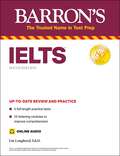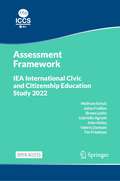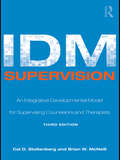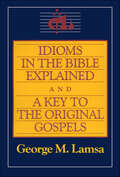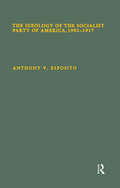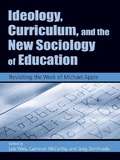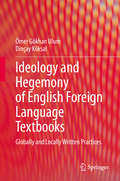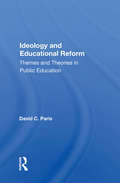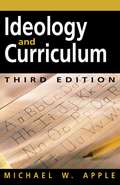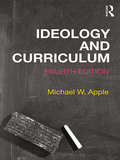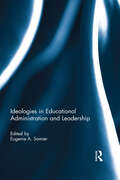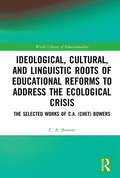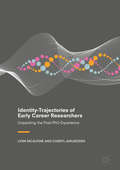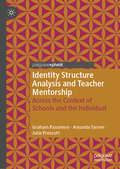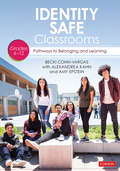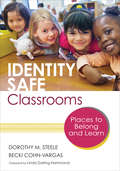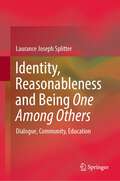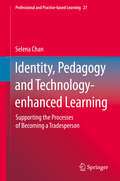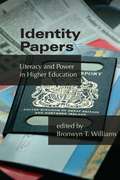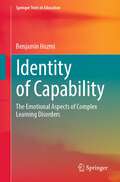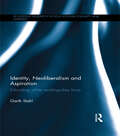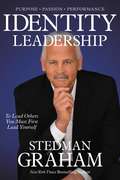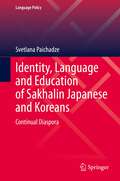- Table View
- List View
IELTS (Barron's Test Prep)
by Lin Lougheed Ph.D.Publisher's Note: Products purchased from Third Party sellers are not guaranteed by the publisher for quality, authenticity, or access to any online entitlements included with the product. Barron&’s updated IELTS provides practice for both Academic and General Training tests. Get practice and explanations for all of the question types, plus audio tracks for the listening section.This edition features:Four practice Academic tests reflective of the most recent examsTwo practice General Training testsOnline audio for all tests and activitiesAn audioscript for the listening sectionsExplanatory answers for all test questionsPractice with all question types, including multiple-choice, short answer, sentence completion, flowchart completion, graphs, tables, note taking, summarizing, labeling diagrams and maps, classification, matching, and selecting from a listThe IELTS is used as a measure of English-language proficiency by over 7,000 educational institutions, government departments and agencies, and professional organizations in 135 countries.
IEA International Civic and Citizenship Education Study 2022 Assessment Framework
by Wolfram Schulz Julian Fraillon Bruno Losito Gabriella Agrusti John Ainley Valeria Damiani Tim FriedmanThis open access publication outlines the underlying framework for gathering data on civic knowledge, attitudes, and engagement as well as contextual information, and it describes the assessment design for the International Association for the Evaluation of Educational Achievement’s (IEA) International Civic and Citizenship Education Study 2022.The IEA International Civic and Citizenship Study (ICCS) investigates how young people are prepared to undertake their roles as citizens in a range of countries in the second decade of the 21st century. ICCS 2022 is a continuation of two earlier IEA studies, ICCS 2009 and ICCS 2016, and, for the first time, this survey includes the option of a computer-based assessment. Responding to enduring and emerging challenges of educating young people in a world where contexts of democracy and civic participation continue to change, the study addresses issues related to young people’s engagement through digital technologies, migration and diversity, perceptions of the political system, global citizenship, and education for sustainable development. Over the past 50 years, IEA has conducted comparative research studies in a range of domains focusing on educational policies, practices, and outcomes in many countries around the world. Prior to ICCS 2022, IEA conducted four international comparative studies of civic and citizenship education, with a first survey implemented in 1971, a second one in 1999, third in 2009 and fourth in 2016. ICCS 2022 data will allow education systems to evaluate the strengths of educational policies, both internationally, and in a regional context, and to measure progress in achieving critical components of their educational policy agendas.
IDM Supervision: An Integrative Developmental Model for Supervising Counselors and Therapists, Third Edition (Counseling and Psychotherapy)
by Cal D. Stoltenberg Brian W. McNeillThe third edition of this book is an updated and expanded presentation of the widely used Integrative Developmental Model of Supervision. In contrast to other volumes on clinical supervision, Stoltenberg and McNeill present a comprehensive, time-tested, and empirically investigated model of supervision, rather than a broad summary of other existing or historical approaches. In addition to presenting a model of therapist development that spans beginning through advanced training, the book integrates theory and research from numerous perspectives, including learning, cognition, and emotion, as well as an up-to-date treatment of research directly addressing the supervision process. The model also examines the role of clinical supervision from an evidence-based practice perspective and addresses issues of common factors in therapy. The impact of cultural issues in supervision and training, as well as recent work in a competencies approach to supervision and trainee development, are also examined.
Idioms in the Bible Explained and a Key to the Original Gospels
by George M. LamsaWorld-renowned Bible translator and commentator George M. Lamsa explains nearly one thousand crucial idioms that will enrich reading of the Old and New Testaments for students and general reader alike.Lamsa, who was raised speaking Aramaic in a community that followed customs largely unchanged since the times of Christ, offers fresh, accurate translations of important idioms, metaphors, and figures of speech found in the Scripture--and provides clear explanations of their meaning of biblical context.Just as Shakespeare, Milton, and Browning wrote in the vernacular for English-speaking people, Moses the prophets, and the apostles wrote for their own people in the plain language of their times, so that even the unlearned might understand God's Word. Over the centuries, inaccurate translations and misunderstandings of customs and concepts have led to difficulties in bringing the biblical message to contemporary English-speaking readers.For example, when a man says to Jesus, "let me bury my father," Lamsa points out that this expression means, "Let me first take care of my father until he dies." Traditionally, scholars assumed that this man's father was dead and that Jesus was not interested in his burial. Lamsa's scholarship offers a more accurate understanding of the intent and spirit of this passage.Idioms in the Bible Explained and a Key to the Original Gospels goes far in correcting such errors that have crept into Biblical scholarship. Obscure and difficult passages from both Old and New Testaments are listed and compared with the King James version (though it will be helpful when used with any English version). These make clear the original meaning of such ancient idioms and assure that our grasp of the biblical message is more sound and rewarding.To further uncover the original teachings of Scripture, Idioms in the Bible Explained and a Key to the Original Gospels, Lamsa discusses at greater length such topics as "The Language of Jesus," "Aramaic Phraseology," "The Sayings of Jesus," "Early Translations," and more..
Idioms: Description, Comprehension, Acquisition, and Pedagogy (ESL & Applied Linguistics Professional Series)
by Dilin LiuThis comprehensive, up-to-date, and accessible text on idiom use, learning, and teaching approaches the topic with a balance of sound theory and extensive research in cognitive linguistics, psycholinguistics, corpus linguistics, and sociolinguistics combined with informed teaching practices. Idioms is organized into three parts: Part I includes discussion of idiom definition, classification, usage patterns, and functions. Part II investigates the process involved in the comprehension of idioms and the factors that influence individuals’ understanding and use of idioms in both L1 and L2. Part III explores idiom acquisition and the teaching and learning of idioms, focusing especially on the strategies and techniques used to help students learn idioms. To assist the reader in grasping the key issues, study questions are provided at the end of each chapter. The text also includes a glossary of special terms and an annotated list of selective idiom reference books and student textbooks. Idioms is designed to serve either as a textbook for ESL/applied linguistics teacher education courses or as a reference book. No matter how the book is used, it will equip ESL/applied linguistics students and professionals with a solid understanding of various issues related to idioms and the learning of them.
The Ideology of the Socialist Party of America, 1901T1917 (Garland Studies in the History of American Labor)
by Anthony V. EspositoExamining the propaganda literature issued by the Socialist Party before World War I, this study investigates how the party shaped its appeal to an American audience. With the rise of an anti-monopoly reform movement after 1908 that rejected all notions of class, and socialist success in some city elections after 1910, the party confronted growing liberal strength. By 1912-13 this confrontation affected the ideological appeal and unity of the party by pitting the loyalties of class and citizenship against each other. By the time the U.S. entered WWI, the idea of class had become taboo in American politics, driving a wedge between radicals and reformers that persists until today.(Ph.D. dissertation, University of Connecticut, 1992; revised with new preface and index)
Ideology, Curriculum, and the New Sociology of Education: Revisiting the Work of Michael Apple
by Lois Weis Cameron McCarthy Greg DimitriadisFor more than three decades Michael Apple has sought to uncover and articulate the connections among knowledge, teaching and power in education. Beginning with Ideology and Curriculum (1979), Apple moved to understand the relationship between and among the economy, political and cultural power in society on the one hand "and the ways in which education is thought about, organized and evaluated" on the other. This edited collection invites several of the world's leading education scholars to reflect on the relationships between education and power and the continued impact of Apple's scholarship. Like Apple's work itself, the essays will span a range of disciplines and inequalities; emancipatory educational practices; and the linkage between the economy and race, class and gender formation in relation to schools.
Ideology and Hegemony of English Foreign Language Textbooks: Globally and Locally Written Practices
by Ömer Gökhan Ulum Dinçay KöksalThis volume investigates ideological and hegemonic practices in globally and locally written English as a Foreign Language (EFL) textbooks, and explores whether these textbooks reflect the values, beliefs and norms of the native-speaker society by examining their ideological components and the hegemonic practices by means of which the source society or state seeks to influence learners of the language. It also attempts to clarify EFL teachers’ and students’ views on the underlying ideology and hegemonic practices in globally and locally written EFL textbooks. Studies on the relationship between ideology, hegemony and textbooks in applied linguistics have become more prevalent in recent decades, as the emergence of critical theory, critical pedagogy, and critical thinking skills from the 1920s onwards has led scholars to adopt a more critical perspective towards EFL textbooks, especially with regard to elements of ideology and hegemony. These two terms encompass a plethora of components, ranging from nationalism to religion. At the same time, the importance of metanarratives originating from the tenets of modernism has declined from the 1960s onwards, the assumption being that the world has entered a new age called postmodernism and post-structuralism that emphasizes the role of individuals and rejects efforts to reinforce post-colonialism, the effects of which can be seen in EFL textbooks. Accordingly, taking the elements of ideology and hegemony into account remains a vital aspect in the analysis of EFL textbooks.
Ideology And Educational Reform: Themes And Theories In Public Education
by David C. ParisIdeology and Educational Reform traces the underlying ideological problems that make genuine educational reform difficult. It describes three major themes in public education: common school, human capital, and clientelism.
Ideology and Curriculum (3rd Edition)
by Michael W. AppleTo celebrate the 25th anniversary of its publication, Michael W. Apple has thoroughly updated his influential text, and written a new preface. The new edition also includes an extended interview circa 2001, in which Apple relates the critical agenda outlined in Ideology and Curriculum to the more contemporary conservative climate. Finally, a new chapter titled "Pedagogy, Patriotism and Democracy: Ideology and Education After 9/11" is also included.
Ideology and Curriculum
by Michael AppleSince 1979, Ideology and Curriculum has been a path breaking statement on the relationship between cultural and economic power in education. The new edition of this now classic text has been updated by celebrated author and activist Michael W. Apple to include a full new chapter on the book’s lasting critical agenda in the context of the contemporary conservative climate. A new substantive preface introduces the fourth edition, reflecting on earlier arguments and developments from the intervening years while a concluding interview details the author’s background and continuing efforts toward building a more equitable society. In celebration of the 40th anniversary of its publication, this highly-anticipated new edition firmly situates Ideology and Curriculum as one of the most important education titles of our time.
Ideologies in Educational Administration and Leadership
by Eugenie A. SamierIdeologies in Educational Administration and Leadership explores ideological dimensions of educational administration in a number of Western and Central European contexts as they influence or shape the understanding, analysis, and practice in the field covering a broad range of topics, such as ethics, governance, diversity, and power. The first section, Philosophical and Theoretical Foundations, includes a range of sociological, political and linguistic approaches to examining ideology in an educational context. The second section, Ideologies of Research and Teaching, includes examinations of neoliberal and technological effects on research and teaching, as well as ideological shifts and challenges, in the West and in Eastern Europe. The last section, Contemporary and International Issues, includes critiques of social media, neoliberal impact on schooling, managerial leadership, university ideologies in Finland, the rationalisation of universities, and the impact of administrative ideologies on school systems. The book will appeal to researchers, practitioners, policy-makers, academics, as well as post-graduates in educational administration theory, and related courses in the ethics and politics of education, educational leadership, and organisational studies.
Ideological, Cultural, and Linguistic Roots of Educational Reforms to Address the Ecological Crisis: The Selected Works of C.A. (Chet) Bowers
by C. A. BowersIn this volume C.A. (Chet) Bowers, whose pioneering work on education and environmental and sustainability issues is widely recognized and respected around the world, brings together a carefully curated selection of his seminal work on the ideological, cultural, and linguistic roots of the ecological crisis; misconceptions underlying modern consciousness; the cultural commons; a critique of technology; and educational reforms to address these pressing concerns. In the World Library of Educationalists series, international scholars themselves compile career-long collections of what they judge to be their finest pieces – extracts from books, key articles, salient research findings, major theoretical and/practical contributions – so the world can read them in a single manageable volume. Readers will be able to follow the themes and strands of their work and see their contribution to the development of a field, as well as the development of the field itself. Contributors to the series include: Michael Apple, James A. Banks, Joel Spring, William F. Pinar, Stephen J. Ball, Elliot Eisner, Howard Gardner, John Gilbert, Ivor F. Goodson, and Peter Jarvis.
Identity-Trajectories of Early Career Researchers: Unpacking the Post-PhD Experience
by Lynn McAlpine Cheryl AmundsenThe book asks how we can make sense of career paths for PhD graduates, something that has rarely been systematically studied. It offers a coherent synthesis of the empirically-based insights that arose from the experiences of 48 early career researchers, who were participants in a 10-year qualitative longitudinal research program. The book has the power to inform other researchers’ conceptual and methodological approaches to the study of post-PhD career trajectories. The authors draw on the conceptual lens of ‘identity-trajectory’, which emerged from their research program, to examine the decision-making processes underpinning the careers of PhD graduates, whether contingent researchers and teachers, assistant professors within the academy or professionals elsewhere. The book highlights the role of personal agency in negotiating academic and non-academic work and careers within broader personal lives. It will be compelling reading for researchers and students working in the areas of Education and Sociology, particularly those with an interest in examining career development and decision-making.
Identity Structure Analysis and Teacher Mentorship: Across the Context of Schools and the Individual
by Graham Passmore Amanda Turner Julie PrescottThis book examines the benefits of applying the Identity Structure Analysis (ISA) to teacher professional development. At present no government, local authority or school is actively applying Identity Structure Analysis to monitor school improvement: in a profession where turnover is extremely high, ISA is framed as a way for professional development to meet the needs of the specific teacher. Examining idiographic ISA analyses as well as practical advice for implementing professional development programs, the authors scrutinise how ISA can be used in conjunction with mentoring to offset teacher turnover. This practical volume will be of interest and value to scholars and researchers of teacher identity and professional development, as well as researchers and policymakers interested in reducing teacher turnover.
Identity Safe Classrooms, Grades 6-12: Pathways to Belonging and Learning
by Amy Epstein Becki Cohn-Vargas Alexandrea Creer KahnWelcome to Identity Safe Classrooms! In identify safe classrooms, students facing negative stereotypes or viewed as different are &“seen,&” accepted, and valued for who and what they are. Their identity is embraced as an asset not a barrier for school success. Identity safety is a research-based set of practices that counter the harmful effects of stereotype threat and allow our students to reach their full capacity for learning, foster positive relationships, and better appreciate the full spectrum of human differences. The second of a two-volume set, Identity Safe Classrooms, Grades 6-12, is a call for educators to come together and realize a vision of schools as transformative places of opportunity and equity for all students. Inside you&’ll find: Design principles for promoting belonging and a welcoming classroom environment Compelling evidence from identity safety research on ways to mitigate stereotype threat along with counter-narratives that challenge societal biases about gender, race, and other differences Pragmatic strategies for student-centered teaching, including trauma-informed practices, that hold high expectations and validate each student&’s background as a resource for learning Vignettes with concrete examples and try-it-out activities and prompts for self-reflection Devour Identity Safe Classrooms, adopt its practices, and soon enough you&’ll inspire in all of your students a greater sense of empathy and agency in their educational experiences. &“Dr. Becki Cohn-Vargas along with Alexandrea Creer Kahn and Amy Epstein show us the intersections between adolescent identity development, racial identity development, and social-emotional development so we know how to use the diversity in classrooms as our strength.&” --Zaretta Hammond, Author of Culturally Responsive Teaching and the Brain &“Identity Safe Classrooms should be in the hands of every educator who walks into a school. It's clear and accessible, grounded in research, thought-provoking and engaging, and actionable, and fills a crucial gap in our resources for creating just and liberated schools.&” --Elena Aguilar, Author of The Art of Coaching &“The authors have done an excellent job showing how an identity safe classroom integrates the growth mindset in a secondary school. When students feel accepted and valued, when they feel safe learning from mistakes and encouraged to continually grow as learners, they can reach their highest potential.&” --Carol Dweck, Stanford University
Identity Safe Classrooms, Grades 6-12: Pathways to Belonging and Learning
by Amy Epstein Becki Cohn-Vargas Alexandrea Creer KahnWelcome to Identity Safe Classrooms! In identify safe classrooms, students facing negative stereotypes or viewed as different are &“seen,&” accepted, and valued for who and what they are. Their identity is embraced as an asset not a barrier for school success. Identity safety is a research-based set of practices that counter the harmful effects of stereotype threat and allow our students to reach their full capacity for learning, foster positive relationships, and better appreciate the full spectrum of human differences. The second of a two-volume set, Identity Safe Classrooms, Grades 6-12, is a call for educators to come together and realize a vision of schools as transformative places of opportunity and equity for all students. Inside you&’ll find: Design principles for promoting belonging and a welcoming classroom environment Compelling evidence from identity safety research on ways to mitigate stereotype threat along with counter-narratives that challenge societal biases about gender, race, and other differences Pragmatic strategies for student-centered teaching, including trauma-informed practices, that hold high expectations and validate each student&’s background as a resource for learning Vignettes with concrete examples and try-it-out activities and prompts for self-reflection Devour Identity Safe Classrooms, adopt its practices, and soon enough you&’ll inspire in all of your students a greater sense of empathy and agency in their educational experiences. &“Dr. Becki Cohn-Vargas along with Alexandrea Creer Kahn and Amy Epstein show us the intersections between adolescent identity development, racial identity development, and social-emotional development so we know how to use the diversity in classrooms as our strength.&” --Zaretta Hammond, Author of Culturally Responsive Teaching and the Brain &“Identity Safe Classrooms should be in the hands of every educator who walks into a school. It's clear and accessible, grounded in research, thought-provoking and engaging, and actionable, and fills a crucial gap in our resources for creating just and liberated schools.&” --Elena Aguilar, Author of The Art of Coaching &“The authors have done an excellent job showing how an identity safe classroom integrates the growth mindset in a secondary school. When students feel accepted and valued, when they feel safe learning from mistakes and encouraged to continually grow as learners, they can reach their highest potential.&” --Carol Dweck, Stanford University
Identity Safe Classrooms: Places to Belong and Learn
by Becki Cohn-Vargas Dorothy M. SteeleEvery child valued and empowered to learn—this book shows you how! <p><p> This book focuses on strategies that positively affect student learning and attachment to schooling, in spite of social inequalities. Research shows that students in identity safe classrooms learn better and like school more than peers in other classrooms. In identity safe classrooms, teachers strive to ensure that students: <p> Feel their identity is an asset rather than a barrier to success <p> Experience diversity as a resource for learning <p> Form positive relationships with fellow students and their teacher <p> Learn in an environment with a challenging curriculum and high expectations <p> Develop a sense of belonging and empathy for others as they learn to use pro-social skills and practice cooperation
Identity, Reasonableness and Being One Among Others: Dialogue, Community, Education
by Laurance Joseph SplitterThis book brings the tools and ideas of Anglo-American analytic philosophy to bear on how we think about issues of contemporary significance, in a way that is accessible to a broad audience. While acknowledging empirical findings within the social sciences, it takes on the prescriptive task of imagining a better world, in which being citizens in a democracy means actively engaging with others. We cling to tribal affiliations which incline us to look inward and spurn those whom we deem to be “other.” And we observe the mind-numbing, herd-like impact of social (and other) media on our capacity – and that of our children – to distinguish truth and good sense from falsehood and nonsense. Such problems demand our attention as reasonable persons who both think for themselves, and deliberate in good faith with others with whom they may well disagree. The good news is that while reasonableness cannot be taken for granted, it can – indeed, it must – be nurtured and it must be taught. This book both articulates a conception of reasonableness and exemplifies a clear standard of reasonableness, with respect to the questions it raises and the author's responses to them.
Identity, Pedagogy and Technology-enhanced Learning: Supporting the Processes of Becoming a Tradesperson (Professional and Practice-based Learning #27)
by Selena ChanThis book gathers work from over a decade of study, and seeks to better understand and support how learners become tradespeople. The research programme applies recent concepts from neuroscience, educational psychology and technology-enhanced learning to explain and help overcome the challenges of learning in trades-learning contexts. Due to the complex and multifarious nature of the work characterising trade occupations, learning how to become a tradesperson requires a significant commitment in terms of time, along with physical and cognitive effort. All modalities (visual, aural, haptic etc.) and literacies (text, numerical, spatial etc.) are required when undertaking trade work. Manual dexterity and strength, coupled with the technical and tacit knowledge required for complex problem solving, not to mention suitable dispositional approaches, must all be learnt and focused on becoming a tradesperson.However, there is a substantial gap in the literature on 'how people learn a trade' and 'how to teach a trade'. In this book, contemporary teaching and learning approaches and strategies, as derived through practice-based participatory research, are used to highlight and discuss pragmatic solutions to facilitate the learning and teaching of trade skills, knowledge and dispositions. The approaches and strategies discussed include the implementation of technology-enhanced learning; project-based inquiry/problem-based learning; and recommendations to ensure learners are prepared for the future of work.
Identity Papers: Literacy and Power in Higher Education
by Bronwyn T. WilliamsHow do definitions of literacy in the academy, and the pedagogies that reinforce such definitions, influence and shape our identities as teachers, scholars, and students? The contributors gathered here reflect on those moments when the dominant cultural and institutional definitions of our identities conflict with our other identities, shaped by class, race, gender, sexual orientation, location, or other cultural factors. These writers explore the struggle, identify the sources of conflict, and discuss how they respond personally to such tensions in their scholarship, teaching, and administration. They also illustrate how writing helps them and their students compose alternative identities that may allow the connection of professional identities with internal desires and senses of self. They emphasize how identity comes into play in education and literacy and how institutional and cultural power is reinforced in the pedagogies and values of the writing classroom and writing profession.
Identity of Capability: The Emotional Aspects of Complex Learning Disorders (Springer Texts in Education)
by Benjamin HozmiThis textbook focuses upon understanding the importance of building an identity of capability as a means of growth, giving, and living a rich and satisfying personal and interpersonal life for people with complex learning disorders. Through this book, teachers will gain a greater understanding of the emotional world of these students and will be able to ‘tune in’ and build trust. The volume presents tools for facilitating ‘empowered teaching’ which supports teachers to create a learning climate that will enable students with complex learning disorders to build trust, gain understanding, and promote development. Establishing an identity of capability will enable students in general, and adults with complex learning disabilities in particular, to identify their true strongpoints, to conceptualize them, and to place them at the forefront of their self-image. The text provides many lively examples for empowering teaching and for implementing the principles of intervention and teaching to students with complex learning disorders as presented in the book. It offers a revision of the teacher’s role and tools for creating an accepting climate within the class that will enhance learning processes.
Identity, Neoliberalism and Aspiration: Educating white working-class boys (Routledge Research in Educational Equality and Diversity)
by Garth StahlIn recent years there has been growing concern over the pervasive disparities in academic achievement that are highly influenced by ethnicity, class and gender. Specifically, within the neoliberal policy rhetoric, there has been concern over underachievement of working-class young males, specifically white working-class boys. The historic persistence of this pattern, and the ominous implication of these trends on the long-term life chances of white working-class boys, has led to a growing chorus that something must be done to intervene. This book provides an in-depth sociological study exploring the subjectivities within the neoliberal ideology of the school environment, in order to expand our understanding of white working-class disengagement with education. The chapters discuss how white working-class boys in three educational sites enact social and learner identities, focusing on the practices of 'meaning-making' and 'identity work' that the boys experienced, and the disjunctures and commonalities between them. The book presents an analysis of the varying tensions influencing the identity of each boy and the consequences of these pressures on their engagement with education. Drawing on Bourdieu’s theoretical tools and a model of egalitarian habitus, Identity, Neoliberalism and Aspiration: Educating white working-class boys will be of interest to academics, researchers and postgraduate students in the field of sociology of education, and those from related disciplines studying class and gender.
Identity Leadership: To Lead Others You Must First Lead Yourself
by Stedman GrahamBecome a passionate, purposeful, and meaningful leader through identifying who you are, your strengths, and your skills. New York Times bestselling author Stedman Graham's Identity Leadership is a very personal and prescriptive guide that is based on his philosophy that a leader can't lead others until he can first lead himself-the more he works on himself, the more he can give to those around him. To know our purpose in life, we begin with our passions, skills, and talents, and with this book we learn how to channel the best of who we are to achieve success for ourselves and those we lead. In Identity Leadership, Graham examines why self-awareness matters, how leaders lead, the importance of communication, and much more. He then shows the reader how to step into their role as a leader and create their identity leadership plan. Key to the journey is believing in yourself, knowing your competence, continually challenging yourself, and being patient with yourself. Graham uses anecdotes from his own life, as well as discussing successful leaders, to illustrate the importance of identity leadership in each of our lives.Self-leaders can create a roadmap that leads to personal growth, development, and improvement of performance in every area of life. Identity Leadership provides the tools-self-awareness, emotional intelligence, discipline, and more-needed to continually plan and execute learning and development of our talents and skills. These tools enable readers to commit to a personal vision and lead with purpose. p.p1 {margin: 0.0px 0.0px 0.0px 0.0px; font: 12.0px Helvetica} p.p2 {margin: 0.0px 0.0px 0.0px 0.0px; font: 12.0px Helvetica; min-height: 14.0px} span.s1 {background-color: #fffb00} p.p1 {margin: 0.0px 0.0px 0.0px 0.0px; font: 12.0px Helvetica} p.p2 {margin: 0.0px 0.0px 0.0px 0.0px; font: 12.0px Helvetica; min-height: 14.0px} span.s1 {background-color: #fffb00} p.p1 {margin: 0.0px 0.0px 0.0px 0.0px; font: 12.0px Helvetica} p.p2 {margin: 0.0px 0.0px 0.0px 0.0px; font: 12.0px Helvetica; min-height: 14.0px} span.s1 {background-color: #fffb00}
Identity, Language and Education of Sakhalin Japanese and Koreans: Continual Diaspora (Language Policy #31)
by Svetlana PaichadzeThis book explores the issues of education, the use of languages and the formation of self-identification of the Japanese and Korean diasporas of Sakhalin, over a hundred years period: from the time they moved to the island, until their “return” to historical homelands in Japan or South Korea. During this time, their language environment and language of education changed 4 times and Japanese and Korean of Sakhalin continued to be a linguistic and ethnic minority.This book is of interest to researchers, students, NGO supporters and education policy makers.
